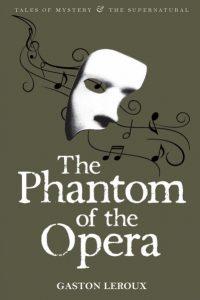“It was the evening on which MM Debienne and Poligny, the managers of the Opera, were giving a farewell gala performance to make their retirement.”
An uncanny tale of love and intrigue.
The Phantom of the Opera was Gaston Leroux’s eighth book. Published in 1910, it went on to become his most notable work. It was originally released as a series in newspapers before finally being released as a novel.
Its infamous setting was actually based on a real Paris opera house. A fire resulted in a chandelier crashing to the stage which killed and injured many performers. Rumors of a ghost spread like wild fire, and not long after, Leroux came up with the idea of the Phantom.
Summary
The story follows a young Swedish woman named Christine. After her father’s death she’s raised in the Paris Opera House itself, surrounded by singers and musicians but also haunted by a strange figure. She christens him her protective angel and listens to everything he says. Until her old friend Raoul comes to visit and they rekindle their romance. The so-called ‘angel’ turns to murder and violence to win her back, resulting in one disaster after another. Then Christine disappears. But who took her?
Commentary
The Phantom of the Opera is one of the darkest Gothic horror works of fiction every written.
Praise
- Leroux depicts a wide variety of characters. There are spoiled prima donna’s, mysterious strangers, deformed phantoms, ballet dancers, and greedy managers to name but a few. There’s someone for every reader to love, hate, or laugh at in almost every chapter.
- The setting is incredible. Based off of a real-life opera house, Leroux manages to make it so much more than that. There’s significance built into every set, whether it’s Erik’s haunted house by the foggy lakeside or the moonlit rooftop that becomes a lovers retreat. Each setting has just as much depth and personality as the characters.
- The mystery and horror are built slowly but surely over the course of the novel. As one bad thing happens after another and bodies begin to appear, the reader is left wondering if this is the work of a serial killer, or if, perhaps, the phantom actually does exist. The book makes you feel uneasy about not knowing and sets the tone brilliantly.
Critique
- The Phantom, Erik, is the French equivalent of Heathcliff. If you like Wuthering Heights, then I’m sure you’ll find this a good thing. If you don’t, and think him to be violent, abusive and manipulative, well, then you know what to expect from our resident Parisian ghost.
- It’s… boring. Really really really boring. Although the beginning is tense and nerve-wracking as people begin to die, once Erik reveals himself, the mystery is over. There are numerous tedious descriptions and rambling tangents about insignificant things. It honestly becomes a struggle to read.
- There is far too much drama for this novel to ever be considered even slightly realistic. Although Leroux himself swore that everything he wrote about actually happened in real life, the dramatization of the people involved makes that fact pointless. There’s swooning, screaming and proclamations of love left right and centre (opera pun!) that make it difficult to keep a straight face. After a while, all this melodrama gets annoying.
Recommendations
Overall, I’d give Gaston Leroux’s The Phantom of the Opera a two out of five. It’s supposedly a love story with fantastic characters and a brillant setting and an absolutely dreadful plot.
I’d only recommend this novel to those who enjoy drama and theatrical tragedy, and no one else. It’s over the top and boring for the most part, no matter how interesting the characters are.

Want to read it for yourself?
Prefer to listen instead?
